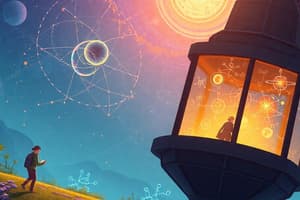Podcast
Questions and Answers
The ______ variable is the variable being tested.
The ______ variable is the variable being tested.
dependent
Exposure to sunlight is an example of an ______ variable.
Exposure to sunlight is an example of an ______ variable.
independent
The ______ involves quantitative data that can be measured in numbers.
The ______ involves quantitative data that can be measured in numbers.
measuring
A ______ is a small part used to represent the entire population.
A ______ is a small part used to represent the entire population.
Conclusions should be made on the basis of ______, not observations.
Conclusions should be made on the basis of ______, not observations.
Theories tie together related hypotheses and are supported by ______ evidence.
Theories tie together related hypotheses and are supported by ______ evidence.
Observation – STEP 1 Employing your five senses to perceive objects or events Asking a Question Based on ______; one or more questions are generated
Observation – STEP 1 Employing your five senses to perceive objects or events Asking a Question Based on ______; one or more questions are generated
The Hypothesis --- Is a statement made in advance that states the results that will be obtained from testing the hypothesis Often written in the form of an “if then” statement Ex: If plants are exposed to sunlight then they will ______
The Hypothesis --- Is a statement made in advance that states the results that will be obtained from testing the hypothesis Often written in the form of an “if then” statement Ex: If plants are exposed to sunlight then they will ______
Forming a Hypothesis – STEP 2 A statement is testable if evidence can be collected that either does or doesn’t support it It can never be proven beyond doubt Often must be refined and revised or ______
Forming a Hypothesis – STEP 2 A statement is testable if evidence can be collected that either does or doesn’t support it It can never be proven beyond doubt Often must be refined and revised or ______
Experimenting – STEP 3 Testing a hypothesis or prediction by gathering data under controlled conditions – conducting a controlled experiment Based on a comparison of a control group with an experimental group A treatment is the condition being tested in the experiment otherwise known as the ______ variable
Experimenting – STEP 3 Testing a hypothesis or prediction by gathering data under controlled conditions – conducting a controlled experiment Based on a comparison of a control group with an experimental group A treatment is the condition being tested in the experiment otherwise known as the ______ variable
Flashcards are hidden until you start studying
Study Notes
Scientific Method
- Observation (STEP 1): employing the five senses to perceive objects or events
- Asking a question based on observations, generating one or more questions
Hypothesis
- Forming a hypothesis (STEP 2): a statement that is testable, where evidence can be collected to support or reject it
- A hypothesis is a statement made in advance, stating the results that will be obtained from testing
- Often written in the form of an "if-then" statement, e.g. "If plants are exposed to sunlight, then they will grow."
- A hypothesis can never be proven beyond doubt, and may need to be refined, revised, or discarded
Experimenting
- Experimenting (STEP 3): testing a hypothesis or prediction by gathering data under controlled conditions
- Conducting a controlled experiment, comparing a control group with an experimental group
- A treatment is the condition being tested in the experiment, also known as the independent variable
- A control group is a group that does not receive the treatment
- The experimental group is the group that contains the test subjects, receiving the treatment
Variables
- Types of variables:
- Independent variable (IV): the variable that is changed
- Dependent variable (DV): the variable being tested
Data and Analysis
- Measuring (STEP 4): involves quantitative data that can be measured in numbers, and/or qualitative data that is not numbers
- Organizing data (STEP 4): placing observations and measurements in order, using graphs, charts, tables, or maps
- Analyzing data (STEP 4): determining whether data is reliable, and whether it supports or rejects a hypothesis
- Conclusion (STEP 5): made on the basis of facts, not observations, and should support the hypothesis, with the possibility of re-testing
Communication
- Communication (STEP 6): sharing results with other scientists, publishing findings in journals, and presenting at scientific meetings
- Scientists must be unbiased, not tamper with data, and only publish and report tested and proven ideas
- Communication is essential to the scientific process, allowing for examination and verification by other scientists
Theories and Laws
- A theory: a broad and comprehensive statement of what is thought to be true, supported by considerable evidence, tying together related hypotheses
- A law: a statement of fact that concisely explains an action or group of actions, accepted as true, universal, and may be expressed as a math equation
Studying That Suits You
Use AI to generate personalized quizzes and flashcards to suit your learning preferences.




